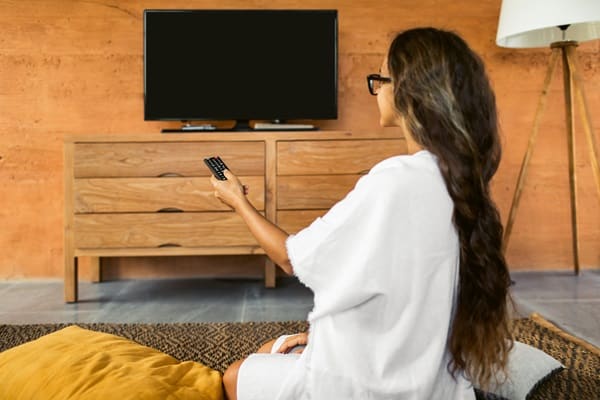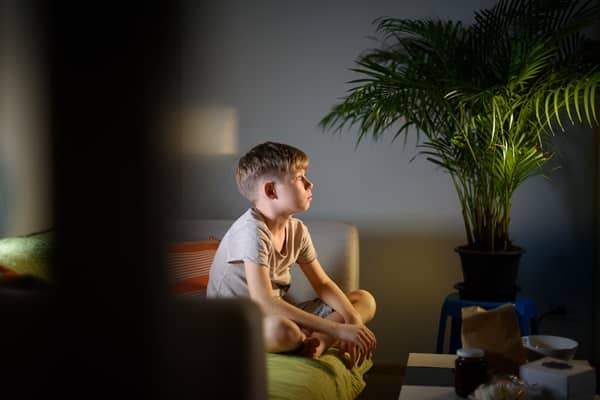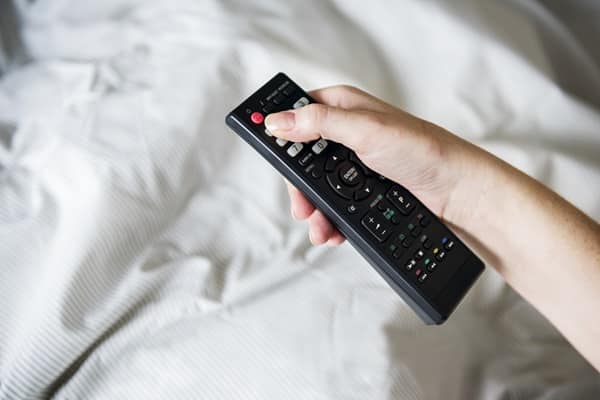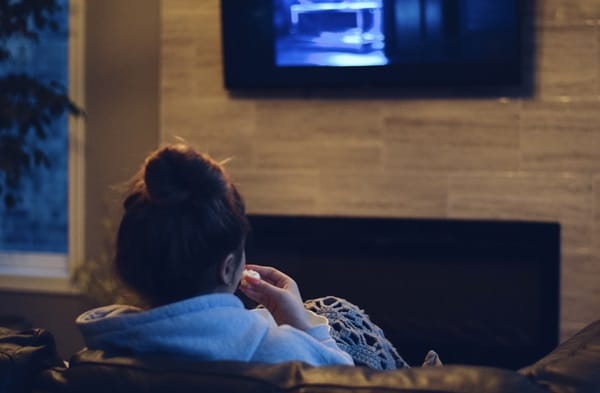In a world where screens dominate evening routines, the habit of watching TV before bed has become increasingly common. Yet, this seemingly harmless activity may have more consequences than many realize. This article delves into the various reasons why turning off the television before bedtime is not just good for a night’s sleep but also beneficial for long-term health and well-being. From disrupting sleep patterns to impacting physical health, understanding the drawbacks of nighttime TV viewing is essential for anyone looking to improve their sleep quality and overall health.
Contents
- 1 Disruption of Sleep Patterns
- 2 Impact on Psychological Health
- 3 Physical Health Implications
- 4 Bedroom Environment and Sleep Hygiene
- 5 Effects on Children and Adolescents
- 6 The Habitual Nature of Late-Night Viewing
- 7 Technological Interventions and Solutions
- 8 Encouraging a Mindful Approach to Evening Routines
- 9 Reclaim the Night for Restful Sleep
Disruption of Sleep Patterns

TV screens emit blue light, which has been proven to disrupt the natural circadian rhythm of the human body. This light tricks the brain into thinking it’s still daytime, reducing the production of melatonin, the hormone responsible for sleep. As a result, individuals find it harder to fall asleep and often experience disturbed sleep throughout the night. The allure of just one more episode can lead to significantly later bedtimes and a reduction in overall sleep quality, leaving viewers feeling tired the next day.
Moreover, the stimulating nature of most TV shows and news programs can keep the mind active and alert, further delaying the onset of sleep. Whether it’s the bright lights, dramatic scenes, or thought-provoking content, television is designed to grab and hold attention, not conducive to the relaxation needed before bed. Regular late-night viewing can lead to a chronic pattern of delayed sleep onset, known as sleep latency, and can disrupt the entire sleep cycle, leading to long-term sleep deficits and associated health problems.
Impact on Psychological Health

Watching TV before bed affects not only the quantity of sleep but also the quality, which, in turn, impacts psychological health. Content that is overly stimulating or distressing, such as thrillers or news reports, can increase stress and anxiety levels. These heightened levels of arousal make it difficult to relax and drift off to sleep, leading to a restless night and a groggy morning. Over time, this can lead to chronic stress symptoms, mood disturbances, and overall decreased mental health.
Additionally, the habit of consuming negative or intense content before bed can lead to nightmares or unsettling dreams, disrupting sleep and causing further stress upon waking. The psychological toll of poor sleep is compounded by the direct effects of disturbing content, creating a cycle of sleeplessness and increased susceptibility to mental health issues. This makes the bedroom far from the peaceful retreat it should be, instead turning it into a space of tension and unease.
Physical Health Implications

The implications of watching TV late into the night extend beyond tired eyes and a restless mind; it significantly impacts physical health. Research links poor sleep quality and shortened duration to an array of health issues, including obesity, heart disease, and diabetes. The sedentary nature of binge-watching exacerbates these risks, as prolonged sitting is associated with a range of adverse health outcomes. When late-night TV viewing becomes a habit, it can lead to significant and lasting damage to physical well-being.
Moreover, the disruption of sleep patterns affects the body’s ability to repair and rejuvenate itself. During sleep, the body undergoes various important processes, including muscle repair, memory consolidation, and hormone regulation. By cutting short these vital processes, regular late-night TV viewing can impair immune function, reduce metabolic rate, and increase the risk of chronic conditions. This ongoing strain on the body not only diminishes quality of life but also shortens life expectancy.
Bedroom Environment and Sleep Hygiene

The environment in which one sleeps plays a critical role in the quality of rest obtained. Introducing a TV into the bedroom transforms the space from a tranquil environment to one of stimulation and distraction. The presence of a television encourages staying up later and introduces unwelcome light and noise, which are detrimental to creating a restful atmosphere. Bedrooms should be reserved for sleep and intimacy, and when they’re dominated by electronic screens, the sanctity of this space is compromised.
To promote better sleep hygiene, individuals are encouraged to remove TVs and other screens from the bedroom and establish a calming pre-sleep routine. This might include reading, meditation, or light stretching—activities that signal to the body it’s time to wind down. By creating a bedroom environment that’s conducive to sleep, individuals can significantly improve their sleep quality, mood, and overall health. It’s about reestablishing the bedroom as a sanctuary for sleep, free from the disruptions and distractions of television.
Effects on Children and Adolescents

Children and adolescents are particularly sensitive to the effects of late-night TV watching, as their brains and bodies are still developing. They require more sleep than adults, and disruptions to their sleep patterns can have significant effects on their mood, behavior, cognitive function, and physical health. The content of late-night television, often not designed for young viewers, can be particularly stimulating or distressing, leading to sleep disturbances and nightmares. The impact of these sleep disturbances goes beyond grogginess, potentially affecting school performance and social development.
Furthermore, establishing healthy sleep habits early in life is crucial for long-term well-being. When children and adolescents become accustomed to falling asleep with the TV on, they are more likely to continue this habit into adulthood, perpetuating the cycle of poor sleep and its associated risks. It’s essential for parents and guardians to model and enforce healthy sleep habits, including limiting TV time before bed, to ensure that children develop patterns that will lead to healthier lives.
The Habitual Nature of Late-Night Viewing

The convenience and comfort of ending the day with television can quickly turn into a deeply ingrained habit. The routine of watching TV before bed often becomes an automatic behavior, one that’s hard to break even when individuals are aware of its negative impacts. Psychological and social factors, such as using TV as a means to unwind or as a nightly ritual with family or roommates, reinforce the habit. Over time, the association between bed and TV becomes so strong that sleep might feel unattainable without it.
To change this habit, individuals need to understand the triggers and rewards associated with late-night TV watching. By identifying these factors, alternative routines can be established. This might include replacing TV with a book or audio content, practicing relaxation techniques, or rearranging the evening schedule to include a wind-down period without screens. Breaking the cycle requires effort and consistency, but the benefits to sleep quality and overall health are well worth it.
Technological Interventions and Solutions

While technology is often part of the problem when it comes to poor sleep habits, it can also be part of the solution. Many devices now come with features designed to mitigate their impact on sleep, such as night modes that reduce blue light emissions or apps that remind users when it’s time to start preparing for bed. Some televisions and streaming services offer options to set viewing limits or end-of-day reminders, helping users stick to a healthier viewing schedule.
Beyond device settings, there are a variety of apps and tools aimed at promoting better sleep. These range from guided meditation and white noise apps to sleep tracking technology that helps users understand and improve their sleep patterns. By taking advantage of these technological aids, individuals can create a more sleep-friendly evening routine that allows them to enjoy their favorite shows in moderation while still prioritizing their health and well-being.
Encouraging a Mindful Approach to Evening Routines

Encouraging a more mindful approach to evening routines is vital for those looking to avoid the pitfalls of late-night TV watching. This involves being conscious of the activities and habits that lead up to bedtime and choosing those that support rather than hinder sleep. Mindfulness practices can help individuals become more aware of their body’s cues for sleep and the impact of their nightly routines on their sleep quality. By tuning into these cues, people can make more informed decisions about how to spend their evenings, opting for activities that promote relaxation and readiness for sleep.
In addition to individual efforts, societal and cultural shifts that prioritize sleep and well-being can support these changes. This might include challenging the notion that staying up late is productive or desirable and promoting a culture that values rest and relaxation. Employers, educators, and healthcare providers can all play a role in emphasizing the importance of sleep and providing the resources and support needed to help individuals adopt healthier habits. By collectively recognizing and addressing the impact of late-night TV watching, we can move toward a more rested and healthy society.
Reclaim the Night for Restful Sleep
In understanding the multifaceted ways that watching TV before bed affects sleep quality, psychological health, and physical well-being, it’s clear that changing this habit can significantly improve your life. Embrace the challenge to reform your nighttime routine, prioritize your health, and reclaim the sanctity of your sleep. Start tonight by turning off the TV earlier and exploring healthier activities that relax and prepare you for a restful night’s sleep. Your body and mind will thank you for the investment in your well-being.


